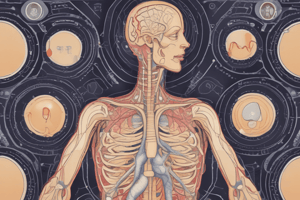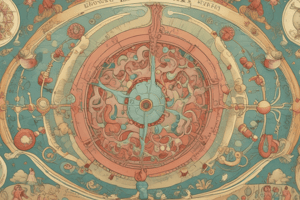Podcast
Questions and Answers
Which of the following best describes the function of a gland?
Which of the following best describes the function of a gland?
- To transport oxygen throughout the body
- To secrete chemical substances for use in the body or for discharge (correct)
- To provide structural support to the body
- To filter blood and remove waste products
Which type of gland releases its products directly into the bloodstream?
Which type of gland releases its products directly into the bloodstream?
- Salivary gland
- Endocrine gland (correct)
- Exocrine gland
- Heterocrine gland
Which of these is an example of a heterocrine gland?
Which of these is an example of a heterocrine gland?
- Adrenal gland
- Pancreas (correct)
- Thyroid gland
- Sweat gland
What is the primary function of the pineal gland?
What is the primary function of the pineal gland?
Which of the following is NOT a role of the hypothalamus?
Which of the following is NOT a role of the hypothalamus?
What is the role of Corticotropin-releasing hormone (CRH)?
What is the role of Corticotropin-releasing hormone (CRH)?
Where are Anti-Diuretic Hormone (ADH) and Oxytocin stored before being released?
Where are Anti-Diuretic Hormone (ADH) and Oxytocin stored before being released?
What is the effect of Anti-Diuretic Hormone (ADH) on the body?
What is the effect of Anti-Diuretic Hormone (ADH) on the body?
What is the primary function of the antidiuretic hormone (ADH)?
What is the primary function of the antidiuretic hormone (ADH)?
Which hormone is known for stimulating the thyroid gland to produce T3 and T4?
Which hormone is known for stimulating the thyroid gland to produce T3 and T4?
Which of these hormones plays a key role in the development of the mammary gland and milk synthesis?
Which of these hormones plays a key role in the development of the mammary gland and milk synthesis?
Which hormone stimulates the contraction of both mammary gland and the uterus?
Which hormone stimulates the contraction of both mammary gland and the uterus?
What is the primary function of calcitonin?
What is the primary function of calcitonin?
Which of the following is stimulated by biological stress and increases the production and release of corticosteroids such as cortisol?
Which of the following is stimulated by biological stress and increases the production and release of corticosteroids such as cortisol?
What can result from hyperthyroidism?
What can result from hyperthyroidism?
Which of the following is a symptom commonly associated with hypothyroidism?
Which of the following is a symptom commonly associated with hypothyroidism?
Elevated levels of CA15-3 are most commonly associated with which condition?
Elevated levels of CA15-3 are most commonly associated with which condition?
Which of the following is the typical reference range for serum Ferritin levels in adult females?
Which of the following is the typical reference range for serum Ferritin levels in adult females?
During the ovulatory surge, what is the expected range for Luteinizing Hormone (LH) levels in women?
During the ovulatory surge, what is the expected range for Luteinizing Hormone (LH) levels in women?
Which of the following represents the upper limit for a normal serum level of Total Prostate-Specific Antigen (T.PSA) in men?
Which of the following represents the upper limit for a normal serum level of Total Prostate-Specific Antigen (T.PSA) in men?
What is the normal range for serum cortisol levels in the AM?
What is the normal range for serum cortisol levels in the AM?
What is the primary function of aldosterone?
What is the primary function of aldosterone?
Which hormone directly stimulates the breakdown of bone matrix when blood calcium levels are low?
Which hormone directly stimulates the breakdown of bone matrix when blood calcium levels are low?
What is the role of glucagon in glucose regulation?
What is the role of glucagon in glucose regulation?
Which hormone is primarily responsible for regulating the sleep/wake cycle?
Which hormone is primarily responsible for regulating the sleep/wake cycle?
What is the function of ferritin?
What is the function of ferritin?
Which vitamin is essential for the development of the brain, nerves, and blood cells?
Which vitamin is essential for the development of the brain, nerves, and blood cells?
What is the main function of thymosin?
What is the main function of thymosin?
Which of the following is NOT a function of cortisol?
Which of the following is NOT a function of cortisol?
Which of the following is NOT a function of Vitamin D in the human body?
Which of the following is NOT a function of Vitamin D in the human body?
Which tumor marker is primarily associated with liver cancer?
Which tumor marker is primarily associated with liver cancer?
Elevated levels of Beta-human chorionic gonadotropin (ß-HCG) are typically indicative of which condition in men?
Elevated levels of Beta-human chorionic gonadotropin (ß-HCG) are typically indicative of which condition in men?
An increase in the levels of Calcitonin in the blood is most closely associated with which type of cancer?
An increase in the levels of Calcitonin in the blood is most closely associated with which type of cancer?
For which condition would elevated levels of Carbohydrate Antigen 125 (CA-125) most likely be checked?
For which condition would elevated levels of Carbohydrate Antigen 125 (CA-125) most likely be checked?
Which tumor marker is commonly elevated in people with digestive tract cancers, particularly pancreatic cancer?
Which tumor marker is commonly elevated in people with digestive tract cancers, particularly pancreatic cancer?
Which tumor marker is commonly assessed when evaluating a patient for possible prostate cancer?
Which tumor marker is commonly assessed when evaluating a patient for possible prostate cancer?
Which tumor marker is associated with both breast cancer and is also a protein that can be measured in the blood?
Which tumor marker is associated with both breast cancer and is also a protein that can be measured in the blood?
Flashcards
Endocrine glands
Endocrine glands
Glands that secrete their products, hormones, directly into the blood.
Exocrine glands
Exocrine glands
Glands that secrete their products through ducts into specific locations.
Heterocrine glands
Heterocrine glands
Glands that perform both exocrine and endocrine functions.
Pineal gland
Pineal gland
Signup and view all the flashcards
Hypothalamus
Hypothalamus
Signup and view all the flashcards
Corticotropin-releasing hormone (CRH)
Corticotropin-releasing hormone (CRH)
Signup and view all the flashcards
Thyrotropin-releasing hormone (TRH)
Thyrotropin-releasing hormone (TRH)
Signup and view all the flashcards
Growth Hormone Releasing Hormone
Growth Hormone Releasing Hormone
Signup and view all the flashcards
What is CA15-3?
What is CA15-3?
Signup and view all the flashcards
What is CA125?
What is CA125?
Signup and view all the flashcards
What is CA19-9?
What is CA19-9?
Signup and view all the flashcards
What is Alpha-fetoprotein (AFP)?
What is Alpha-fetoprotein (AFP)?
Signup and view all the flashcards
What is Carcinoembryonic antigen (CEA)?
What is Carcinoembryonic antigen (CEA)?
Signup and view all the flashcards
Parathyroid hormone (PTH)
Parathyroid hormone (PTH)
Signup and view all the flashcards
Adrenal Cortex
Adrenal Cortex
Signup and view all the flashcards
Aldosterone
Aldosterone
Signup and view all the flashcards
Cortisol
Cortisol
Signup and view all the flashcards
Insulin
Insulin
Signup and view all the flashcards
Glucagon
Glucagon
Signup and view all the flashcards
Ferritin
Ferritin
Signup and view all the flashcards
Vitamin B12
Vitamin B12
Signup and view all the flashcards
What is the pituitary gland?
What is the pituitary gland?
Signup and view all the flashcards
How is the pituitary gland structured?
How is the pituitary gland structured?
Signup and view all the flashcards
What hormones are produced by the anterior lobe?
What hormones are produced by the anterior lobe?
Signup and view all the flashcards
What is the function of growth hormone (GH)?
What is the function of growth hormone (GH)?
Signup and view all the flashcards
What is the function of prolactin?
What is the function of prolactin?
Signup and view all the flashcards
What is the function of thyroid-stimulating hormone (TSH)?
What is the function of thyroid-stimulating hormone (TSH)?
Signup and view all the flashcards
What hormones are released by the posterior lobe?
What hormones are released by the posterior lobe?
Signup and view all the flashcards
What is the function of anti-diuretic hormone (ADH)?
What is the function of anti-diuretic hormone (ADH)?
Signup and view all the flashcards
What is the function of oxytocin?
What is the function of oxytocin?
Signup and view all the flashcards
What are the roles of vitamin D in the body?
What are the roles of vitamin D in the body?
Signup and view all the flashcards
What are tumor markers?
What are tumor markers?
Signup and view all the flashcards
What is Alpha-fetoprotein (AFP) and how is it related to cancer?
What is Alpha-fetoprotein (AFP) and how is it related to cancer?
Signup and view all the flashcards
What is Beta-human chorionic gonadotropin (ß-HCG) and how is it related to cancer?
What is Beta-human chorionic gonadotropin (ß-HCG) and how is it related to cancer?
Signup and view all the flashcards
What is Beta2 (ß2)-microglobulin and how is it related to cancer?
What is Beta2 (ß2)-microglobulin and how is it related to cancer?
Signup and view all the flashcards
What is Calcitonin and how is it related to cancer?
What is Calcitonin and how is it related to cancer?
Signup and view all the flashcards
What is Carbohydrate antigen 125 (CA-125) and how is it related to cancer?
What is Carbohydrate antigen 125 (CA-125) and how is it related to cancer?
Signup and view all the flashcards
What is Carbohydrate antigen 19-9 (CA 19-9) and how is it related to cancer?
What is Carbohydrate antigen 19-9 (CA 19-9) and how is it related to cancer?
Signup and view all the flashcards
Study Notes
Glands
- A gland is an organ that secretes specific chemical substances for use within the body or for release into the surrounding area.
- Three types of glands exist: endocrine, exocrine, and heterocrine.
Exocrine Glands
- Exocrine glands secrete their products into ducts.
- Examples include sweat glands, salivary glands, mammary glands, stomach, and liver (the largest gland).
Endocrine Glands
- Endocrine glands secrete their products (hormones) directly into the bloodstream.
- Examples include the pituitary gland, thyroid gland, and adrenal gland.
Heterocrine Glands
- Heterocrine glands perform both exocrine and endocrine functions.
- The pancreas is an example.
Endocrine System
- The endocrine system is a complex network of glands and organs that produce and release hormones into the bloodstream to regulate various bodily functions.
Pineal Gland
- The smallest gland.
- Produces melatonin.
- Regulates sleep.
Hypothalamus
- A small region of the brain.
- Controls body temperature, blood pressure, and heart rate.
- Releases hormones that control other glands.
Hypothalamus Hormones
- Corticotropin-releasing hormone (CRH) signals the pituitary gland to produce adrenocorticotropic hormone (ACTH).
- Thyrotropin-releasing hormone (TRH) signals the pituitary to make thyroid-stimulating hormone (TSH).
- Gonadotropin-releasing hormone (GnRH) signals the pituitary to produce follicle-stimulating hormone (FSH) and luteinizing hormone (LH).
- Growth hormone-releasing hormone signals the pituitary to produce growth hormone (GH).
- Somatostatin signals the pituitary to produce less growth hormone (GH).
- Anti-diuretic hormone (ADH) signals the kidneys to conserve water and constricts blood vessels, increasing blood pressure.
- Oxytocin helps the uterus contract and is important for breastfeeding.
Pituitary Gland
- A small gland in the brain controlled by the hypothalamus.
- Divided into anterior and posterior lobes.
- Secretes at least six hormones.
Pituitary Gland Hormones (Anterior Lobe)
- Growth hormone (GH): Stimulates growth of bones, cartilage, and connective tissue.
- Prolactin: Important for mammary gland development and milk production.
- Thyroid-stimulating hormone (TSH): Stimulates the thyroid gland to produce T3 and T4 hormones.
- Follicle-stimulating hormone (FSH): Stimulates the development and maturation of reproductive processes.
- Luteinizing hormone (LH): Stimulates the production of androgens in the gonads (testes and ovaries).
- Adrenocorticotropic hormone (ACTH): Stimulates the adrenal cortex to produce corticosteroids.
Pituitary Gland Hormones (Posterior Lobe)
- Antidiuretic hormone (ADH): Conserves water in the kidneys.
- Oxytocin: Stimulates uterine contractions and milk production.
Thyroid Gland
- One of the largest glands in the body.
- Requires iodine to function.
- Produces thyroid hormones T4 and T3, which regulate metabolic rates.
Thyroid Disorders
- Hyperthyroidism: Can lead to Graves' disease with symptoms like sweating, rapid heartbeat, weight loss, and nervousness.
- Hypothyroidism: Symptoms include tiredness, weight gain, and slow metabolism.
- Hashimoto's Thyroiditis: An autoimmune disorder causing inflammation of the thyroid gland.
- Thyroid Tumors: Can cause an overproduction of thyroid hormones.
Thyroid Hormones
- Calcitonin: Produced by C-cells in the thyroid gland; regulates calcium levels in the blood by inhibiting osteoclast activity and decreasing calcium absorption in the kidneys.
- Inhibitory feedback mechanisms regulate the production of thyroid hormones.
Parathyroid Gland
- The parathyroid hormone (PTH) regulates blood calcium levels.
- If calcium levels are low, osteoclasts break down bone to release calcium and reduce calcium loss in urine.
Adrenal Gland
- Located on the kidneys.
- Composed of two regions: medulla and cortex.
Adrenal Medulla
- Releases epinephrine and norepinephrine (adrenaline and noradrenaline) in response to stress and physical activity.
- Increases heart rate, blood pressure, and metabolic rate in skeletal muscles.
Adrenal Cortex
- Releases aldosterone, a mineralocorticoid regulating sodium and potassium levels, indirectly influencing blood pressure and blood volume.
- Releases cortisol, a glucocorticoid increasing blood sugar, regulating the sleep-wake cycle, and influencing inflammatory and immune responses.
Pancreas
- An organ in the abdomen.
- Insulin regulates blood glucose levels after meals by storing extra glucose as glycogen.
- Glucagon regulates blood glucose levels between meals by breaking down glycogen into glucose.
Thymus Gland
- Produces thymosin, a hormone stimulating T cell production.
Anemia Profile
- Ferritin: A protein that stores iron for use in red blood cells production.
- Vitamin B12: Essential for the production of healthy red blood cells and the functioning of the brain, nerves, and other organs.
- Folate: A B-vitamin important for cell division and the formation of red blood cells.
Vitamin D
- Fat-soluble vitamin produced in the skin when exposed to sunlight.
- Important for bone health, immune function, and other bodily processes.
Tumor Markers
- Substances like proteins produced in higher amounts by cancer cells compared to normal cells.
- Used in diagnosing and monitoring cancer.
- examples like alpha-fetoprotein (AFP), beta-human chorionic gonadotropin (B-HCG), beta₂-microglobulin, calcitonin, carbohydrate antigen 125 (CA-125), and carbohydrate antigen 19-9 (CA 19-9). Also Carcinoembryonic antigen (CEA) and Prostate-specific antigen (PSA) and thyroglobulin and CA-15-3
Normal Range of Hormones
- Ranges of various hormones to be used for analysis and comparison of data for testing purposes.
Studying That Suits You
Use AI to generate personalized quizzes and flashcards to suit your learning preferences.




